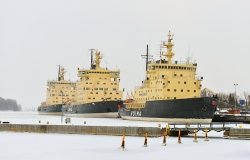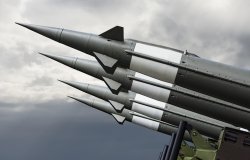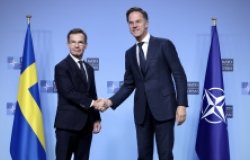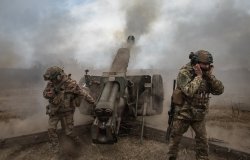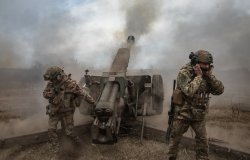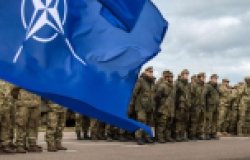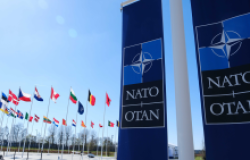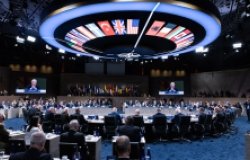177. NATO'S Calculation: No Alternative In The Former Yugoslavia
The international strategy on Kosovo, developed in early 1999, ran off course when the Kosovar Albanians did not initially accept proposals for an agreement because it did not offer their ultimate goal: separation. The international strategy assumed that the Kosovar Albanians would agree and that a threat to use air power against Serbian forces to coerce agreement might be required. It also assumed that eventually Belgrade would back down.
Even if the Kosovo Liberation Army (UCK) agreed to the plan, however, there were a number of questions regarding the use of air power against Serbian and Federal Republic of Yugoslavia (FRY) forces should Belgrade not accept.
It was conceivable, for example, that FRY President Slobodan Milosevic did not believe that bombing would occur. When threats were made in October 1998, it was clear that there were differences of opinion within NATO regarding the legal authority and political perspective for handling the Kosovo conflict. Perhaps Milosevic recognized this, which would explain his intensification of the program of ethnic cleansing through deliberate attacks on civilian communities in Kosovo and his "definitive" rejection of a multi-national implementation force. It was only at the last moment when clear signals persuaded him that NATO was not bluffing that he agreed in 1998 to a cease fire and withdrawal of forces (on which he reneged in 1999).
It was also possible that a NATO-led implementation force would simply be unacceptable for Milosevic. There were good reasons for this from his point of view. He must be afraid that the International Tribunal in The Hague will attempt to arrest him. The events in Kosovo have created a far stronger criminal case against him than was ever possible over Bosnia because of the direct command connection. He might suspect that the presence of a force on FRY territory, as with the Stabilization Force (SFOR) in Bosnia and Hercegovina, could provide the context in which arrests are made. It would be surprising if the FRY President and those around him were not deeply concerned by this prospect. Although authority to arrest on Serbian territory exists anyway under Article 29 of the Tribunal Statute, the presence of ground forces might render support for arrest operations more practicable (although it equally might diminish the chances of a surprise raid).
It was equally conceivable that Milosevic might welcome bombing. His acceleration of attacks in March 1999 seemed designed precisely to provoke Western bombing. There was good reason to suppose that Milosevic might calculate that, in the short term, his power would be consolidated as air raids rallied popular support and, more crucially, ensured disciplined backing from the elite. While bombing would significantly destroy the internal security force (MUP) and Yugoslav Army (VJ) instruments upon which his power and control depends in the long term, the short term benefit might make damage of this kind tolerable. There was therefore a risk that, if the aerial use of armed force could not break Milosevic's control and force a change of mind, he might well benefit temporarily from such action. However, he could not afford to have the infrastructure on which his control of the state depends badly corroded by NATO action for the long term.
Linked to this, was the question of what air power could achieve. It could destroy and denude Serbian capabilities, limiting their use against Kosovar Albanian civilians and, in effect, against the UCK (at some stage, if not immediately). Beyond this, the strategy could only work if raids were targeted to cause Milosevic and his regime pain at its neuralgic points. While the logic in this situation pointed to Serbian agreement, there was always the chance that the logic might not apply.
There was also a serious question regarding the fate of Montenegro, should NATO air action be required. As far as possible, within the limits of international diplomacy, Western countries had offered their backing to the reform program of President Milo Djukanovic. NATO bombing that could not avoid striking sites in Montenegro would hamper the Djukanovic program. While his admirable gestures showed the right approach, such as warning the people to blame Milosevic, not NATO, if there were air raids, it is unlikely that his pro-NATO message would convince all the people who witness NATO munitions detonating on their territory. Given that Western support for Djukanovic is partly predicated on the judgement that, in the absence of any credible opposition in Serbia, he, in the Yugoslav context, is the only serious opposition to Milosevic, air action that could result in a general weakening of the Montenegrin president is not desirable. On the other hand, however, Djukanovic needs a NATO-led presence on the ground in Kosovo, which might require NATO air action first, to provide the security and stability necessary to successful reform in Montenegro.
Intra-Alliance relations remained an issue, as did links with Russia. Different political perspectives remained within the Alliance regarding the timing and extent of possible air strikes. However, as in the October, 1998, situation when the allied threat of action in part caused Milosevic to accept the Holbrooke agreement, as well as over Bosnia and Hercegovina in 1995, the Allies have demonstrated that, whatever their differences, when Alliance credibility is at stake, they will act. As in those cases, they have also shown that, however much they would prefer to act in concert with a Russia also seeking to foster security and stability in Europe, they will act without such support, if need be.
Ultimately, NATO's credibility, in line with the demands of deterrence theory during the Cold War, was paramount. With Alliance credibility on the line, the logic of the situation was such that the Allies would have to take action if the UCK signed the agreement and Belgrade did not. To demonstrate this and to reinforce the links with the situation in Bosnia and Hercegovina, resolve was shown in the period before Kosovo talks resumed in mid-March by international action that saw Bosnian Serb President Nikola Poplasen sacked for failure to cooperate in peace implementation and the town of Brcko, strategically vital to Serbian notions of Bosnian Serb statehood, removed from Republika Srpska's control and given separate status under joint local administration. This was also the kind of situation in which further apprehension of war crimes indictees might be expected. Action regarding Bosnia and Hercegovina was a signal of similar resolve over Kosovo.
The dangers in NATO's not showing resolve, both regarding the message sent to the parties in the former Yugoslav lands and in the wider world about NATO credibility, as well as the potential damage to transatlantic relations of a failure to act, meant that the Alliance had no option but to act, if the circumstances required it. The same logic applied to the question of committing a ground force to implement an agreement, whether reached with or without coercive air action. NATO's credibility regarding the parties, its image, and standing in international eyes, and its meaning and value as a vital asset and interest of its members meant that the 28,000-strong force envisaged by plans would need to be deployed, not only to assist peace in Kosovo, but to ensure that the vital interest of each member in maintaining Alliance strength was met.
Deployment of a Kosovo Force (KFOR) would only be the beginning of a process. That process, including the possibility of bombing, as in Bosnia, will entail risks. In both cases, the process also requires not only an implementation force to produce security through enforcement and the threat of force for a number of years, but also a security program that will remove the military conditions for conflict in the longer-term. This means a fifteen year program of partnership activities with NATO and its members aimed at strengthened relations with the Alliance through Partnership for Peace, the Euro-Atlantic Partnership Council and, even, potential membership. However, activity of this kind will only be facilitated by commensurate political and economic commitment to create the conditions for prosperity and the possibility of a normal life.
About the Author
James Gow
Read More
Global Europe Program
The Global Europe Program is focused on Europe’s capabilities, and how it engages on critical global issues. We investigate European approaches to critical global issues. We examine Europe’s relations with Russia and Eurasia, China and the Indo-Pacific, the Middle East and Africa. Our initiatives include “Ukraine in Europe” – an examination of what it will take to make Ukraine’s European future a reality. But we also examine the role of NATO, the European Union and the OSCE, Europe’s energy security, transatlantic trade disputes, and challenges to democracy. The Global Europe Program’s staff, scholars-in-residence, and Global Fellows participate in seminars, policy study groups, and international conferences to provide analytical recommendations to policy makers and the media. Read more
